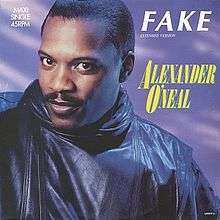Fake (Alexander O'Neal song)
| "Fake" | ||||||||||
|---|---|---|---|---|---|---|---|---|---|---|
 | ||||||||||
| Single by Alexander O'Neal | ||||||||||
| Format | CD single, cassette single, 7" vinyl, 12" vinyl | |||||||||
| Recorded | June 1987 | |||||||||
| Genre | Post-disco, Dance-pop, R&B | |||||||||
| Length | 3:57 | |||||||||
| Label | Tabu | |||||||||
| Writer(s) | James Harris, Terry Lewis and Ajaz Mohammed | |||||||||
| Producer(s) | James Harris, Terry Lewis | |||||||||
| Alexander O'Neal singles chronology | ||||||||||
| ||||||||||
| ||||||||||
"Fake" is a song written by Jimmy Jam and Terry Lewis and recorded by American recording artist Alexander O'Neal. It is the first single from the singer's second solo album, Hearsay (1987). It is one of the artist's most recognizable signature songs, and a favorite of many O'Neal fans worldwide.
Meaning
The songs lyrics are a personal commentary, critical of a loudmouth - implied to be a groupie.
Release
The single was O'Neal's most successful song on both soul and pop charts. "Fake" went to number one on the Hot Black Singles chart for two weeks, and peaked at number twenty-five on the Hot 100.[1] The single was also O'Neal's most successful single on the dance charts, peaking at number seven.[2]
In popular culture
The song was later interpolated for Patti LaBelle's 1997 hit, "When You Talk About Love", repeating the "Patti Patti" refrain after the singer demands her background to say her name.
Track listing
- 12" Maxi (Tabu TBU 650859 6, 650859 6)
- "Fake (Extended Version)" - 5:20
- "Fake (Edited Version)" - 3:11
- "Fake (Patty Mix)" - 3:10
- "Fake (A Cappella)" - 2:20
- "Fake (Instrumental)" - 4:35
- 7" Single (Tabu ZS4-07100)
- "Fake (Edited Version)" - 3:10
- "A Broken Heart Can Mend" - 3:40
Personnel
Credits are adapted from the album's liner notes.[3]
- Alexander O'Neal - lead vocals
- Jimmy Jam - drum and keyboard programming, keyboards, percussion, backing vocals
- Terry Lewis - percussion, backing vocals
- Jerome Benton, Jellybean Johnson, James 'Popeye' Greer, Jimmy Jam, Terry Lewis - fake fellas
Sales chart performance
Peak positions
| Chart (1987) | Position |
|---|---|
| US Billboard Hot 100[4] | 25 |
| US Hot R&B/Hip-Hop Songs[4] | 1 |
| US Hot Dance Club Songs[4] | 7 |
| Belgium VRT Top 30[5] | 15 |
| UK Singles Chart[6] | 33 |
| German Media Control Charts[7] | 17 |
| Dutch MegaCharts[8] | 20 |
| Swiss Music Charts[9] | 22 |
| Recorded Music NZ[10] | 16 |
References
- ↑ Whitburn, Joel (2004). Top R&B/Hip-Hop Singles: 1942-2004. Record Research. p. 440.
- ↑ Whitburn, Joel (2004). Hot Dance/Disco: 1974-2003. Record Research. p. 194.
- ↑ Hearsay liner notes. Tabu Records. 1987.
- 1 2 3 "US Singles Charts > Alexander O'Neal". Billboard. Retrieved 2012-05-26.
- ↑ "BEL Charts > Alexander O'Neal". VRT Top 30. Retrieved 2012-05-26.
- ↑ "UK Charts > Alexander O'Neal". Official Charts Company. Retrieved 2012-05-26.
- ↑ "GER Charts > Alexander O'Neal". Media Control Charts. Retrieved 2012-05-26.
- ↑ "NL Charts > Alexander O'Neal". MegaCharts. Retrieved 2012-05-26.
- ↑ "SWI Charts > Alexander O'Neal". Swiss Music Charts. Retrieved 2012-05-26.
- ↑ "NZ Charts > Alexander O'Neal". Recording Industry Association of New Zealand. Retrieved 2012-05-26.
| Preceded by "I Feel Good All Over" by Stephanie Mills |
Billboard Hot Black Singles number-one single July 25, 1987 - August 1, 1987 (two weeks) |
Succeeded by "The Pleasure Principle" by Janet Jackson |